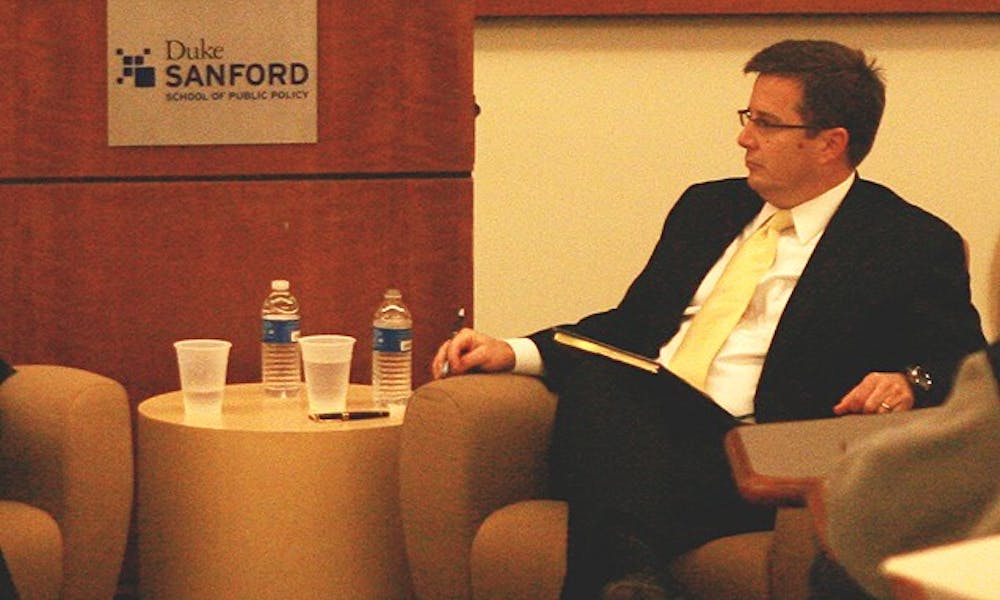When junior Talia Glodjo watched government policies unfold after the events of Sept. 11, 2001, she said it was easy to criticize the Bush Administration for some of its decisions.
But after joining Duke’s American Grand Strategy Program, Glodjo said she now has a completely different perspective-—and she is not alone.
“9/11 created a generation of young people who recognize that national security and global affairs really matter and can affect them personally,” said Peter Feaver, co-director of the Duke AGS program and Alexander F. Hehmeyer professor of political science. “There is a steady supply of students who want to discuss these issues and who are interested in really understanding them.”
An interdisciplinary program focusing on U.S. foreign policy, AGS started in Spring 2008 under the leadership of Feaver, who was also a special adviser on the National Security Council Staff at the White House from 2005 to 2007.
Featuring a core seminar course offered to undergraduate and graduate students, introductory and seminar courses taught by AGS-affiliated faculty, speaker events and other specialized programming, AGS filled a void on Duke’s campus for students interested in homeland security issues, Feaver noted.
Feaver said when he left his government position to come to Duke, he saw an opportunity to build a security studies program with strong collaboration between the Sanford School of Public Policy and the political science department. Describing grand strategy as a international relations theory, Feaver said it is the collection of plans, policies and national resources the United States uses to achieve its national goals.
Glodjo, who is from Canada, said Feaver’s inside perspective to post-9/11 policy allowed her to see the event from a different angle and bridge the gap from what she perceived and what was true.
“His anecdotes [about The White House] made me really see that counterterrorism is never an easy thing,” she said. “I saw the events of 9/11 happen not as something in isolation but as a string of messages that the Middle East was trying to send to the United States over a number of years.”
Sophomore Daniel Strunk, a member of the AGS Undergraduate Advisory Council, wrote in an email Tuesday that he now sees AGS as a field of foreign policy heavily related to the aftermath of 9/11, adding that he now understands the aftermath of the attack from a foreign policy standpoint.
“The events of 9/11 underscored many of the factors that one assesses in determining a grand strategy,” Strunk said. “These include national security, the changing face of warfare and international diplomacy and the emergence of non-state actors as potential threats to U.S. ideals.”
Involvement in the AGS program does not end with Glodjo and Strunk. The AGS listserv currently boasts more than 550 members. Feaver wrote in an email Wednesday that after four years of teaching the core seminar in the program, a combined 60 graduate and undergraduate students- have taken the course and a majority remain heavily involved in the program. In addition, approximately 120 students have taken the 10 AGS-affiliated courses such as “Counterterrorism, Law and Policy” and “9/11: Causes, Response and Strategy” taught by David Schanzer, director of the Triangle Center on Terrorism and Homeland Security and visiting professor of public policy.
Schanzer said that to date, 9/11 is the most consequential event in the lifetime of most current undergraduates. With that in mind, it makes sense that there is an active student body interested in the issues.
“Students who are freshmen today were born after the Berlin Wall fell,” Schanzer said. “[9/11] really has been front and center and reinforced by personal experiences with this generation. Whether they are interested in what is happening in the Middle East, or 9/11 or military issues, AGS covers all of it.”
Chelsea Goldstein, Trinity ’10, wrote in an email Monday that the Sept. 11 terrorist attacks enlightened her to the domestic ramifications of international relations.
“AGS taught me how complex it is to try to aggregate all foreign policy decisions,” Goldstein said. “Feaver really convinced me that in the current world, the U.S. needs a global presence.”
Feaver’s contribution to homeland security knowledge extends beyond informing the Duke population. Co-authoring a chapter of the book “Assessing Strategic Choice in the War on Terror,” Feaver said many of the decisions made after 9/11 that are perceived to be wrong had alternative decisions that would not have achieved substantially better results for the country.
“Let’s take the decision to elevate terrorism as a first-rank concern,” he said. “Some people say that we should not have elevated it to the level of war, but [instead] as a basic problem as it had been treated in the nineties. But when you look at it, we show that by not elevating the status of the issue, it would have made al Qaeda stronger and doing so weakened them. It was a close call.”
Looking toward the future of homeland security policy and counterterrorism efforts, Feaver said the future of AGS is in a period of grand debate and large flux.
“We are possibly coming to the end of a 20-year cycle of one grand strategy since the end of the Cold War,” he said. “9/11 is a new line of action in terms of terrorism, but we may be coming to the end of it because of the financial crisis. We see both Democrats and Republicans having that line of thinking. The 2012 elections could have a grand impact.”
Get The Chronicle straight to your inbox
Signup for our weekly newsletter. Cancel at any time.

